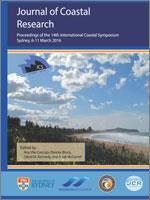Son, M., Byun, J., Kim, S., and Chung, E.-S., 2016. Effect of particale size on calibration of Schmidt number. In: Vila-Concejo, A.; Bruce, E.; Kennedy, D.M., and McCarroll, R.J. (eds.), Proceedings of the 14th International Coastal Symposium (Sydney, Australia). Journal of Coastal Research, Special Issue, No. 75, pp. 148–152. Coconut Creek (Florida), ISSN 0749-0208.
The effect of particle size on calibrating the Schmidt number (σc) is numerically investigated in this study. The experiments are carried out under different conditions of flow type and particle size. From calculation results, it is known that σc is calibrated to be 0.25 to 2.0 as the particle size changes from 320 μm to 130 μm. The value of σc shows the inverse-relationship with particle size. σc determines the particle diffusivity. When σc is smaller than 1.0, the particle diffusivity becomes larger than the momentum diffusivity. A large particle having large inertia can diffuse relatively more compared to small particle under the condition that the turbulent intensity decreases. Therefore, σc is calibrated to be small as the particle size increases. This idea is examined by calculating the Stokes number and sediment diffusivity. As the particle size increases, both of Stokes number and sediment diffusivity also increase.





